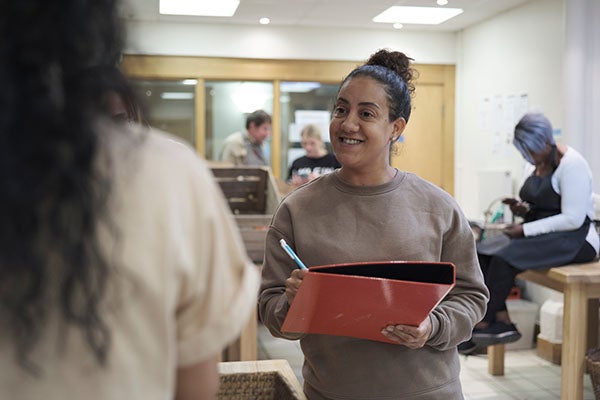Social Work

Admissions Office
Email: admissions@muskegoncc.edu
Phone: (231) 777-0366
Office Hours:
Mon: 8:30am – 6:30pm
Tue-Thu: 8:00am – 5:30pm
Fri: 8:00am – 12:00pm
Counselor
George Sharp
Faculty – Department Chair, Counselor - Human Services
Email: Counselingandadvising@muskegoncc.edu
Phone: 231-777-0362
Office Hours:
Mon-Thu: 8:00 am - 4:30 pm
Fri: 8:00 am - 12:00 pm (virtually)
Degrees/Certificates
WHY SOCIAL WORK?
Social workers help people cope with challenges in their lives. They help with a wide range of situations, such as adopting a child or being diagnosed with a terminal illness. Advocacy is an important aspect of social work. Social workers advocate or raise awareness with and on behalf of their clients and the social work profession on local, state, and national levels.
The following are examples of types of social workers:
- Bachelor’s social workers (BSW)—work with groups, community organizations, and policymakers to develop or improve programs, services, policies, and social conditions. This focus of work is referred to as macro social work.
- Social workers who are licensed to diagnose and treat mental, behavioral, and emotional disorders are called clinical social workers (CSW) or licensed clinical social workers (LCSW). They provide individual, group, family, and couples therapy; they work with clients to develop strategies to change behavior or cope with difficult situations; and they refer clients to other resources or services, such as support groups or other mental health professionals. Clinical social workers can develop treatment plans with the client, doctors, and other healthcare professionals and may adjust the treatment plan if necessary based on their client’s progress. They may work in a variety of specialties. Clinical social workers who have not completed two years of supervised work are often called master’s social workers (MSW).
- Child and family social workers protect vulnerable children and help families in need of assistance. They help families find housing or services, such as childcare, or apply for benefits, such as food stamps. They intervene when children are in danger of neglect or abuse. Some help arrange adoptions, locate foster families, or work to reunite families.
- School social workers work with teachers, parents, and school administrators to develop plans and strategies to improve students’ academic performance and social development. Students and their families are often referred to social workers to deal with problems such as aggressive behavior, bullying, or frequent absences from school.
- Healthcare social workers help patients understand their diagnosis and make the necessary adjustments to their lifestyle, housing, or healthcare. For example, they may help people make the transition from the hospital back to their homes and communities. In addition, they may provide information on services, such as home healthcare or support groups, to help patients manage their illness or disease. Social workers help doctors and other healthcare professionals understand the effects that diseases and illnesses have on patients’ mental and emotional health. Some healthcare social workers specialize in geriatric social work, hospice and palliative care, or medical social work.
- Mental health and substance abuse social workers help clients with mental illnesses or addictions. They provide information on services, such as support groups and 12-step programs, to help clients cope with their illness. Many clinical social workers function in these roles as well.




